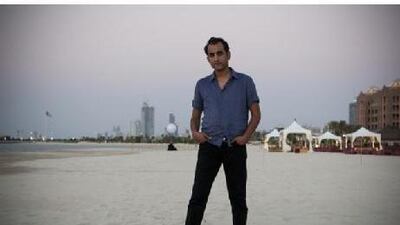ABU DHABI // The first of five films financed in part by the Abu Dhabi Film Festival (ADFF) had its premiere last night.
Qarantina - a film about a family in Baghdad who took in a hitman as a lodger after the 2003 invasion - received a $30,000 (Dh110,000) grant this year from Abu Dhabi Film Festival's Dh1.8 million Sanad fund.
The funding was invaluable to the progress of the film, said Oday Rasheed, the film's Iraqi director. He added that he was campaigning for the 88-minute feature to become the first commercial release in his home country since 1991.
"Sanad and the ADFF were a great help for the post production of my film," he said. "Thanks to them, I managed to get the film completed in Germany and now it is part of a great moment for the film industry in Iraq."
The film, which was screened in Marina Mall last night and will be repeated this afternoon, is the second feature film for the director who also established the Iraqi Independent Film Centre in Baghdad.
He said its release marked a time for a new cinematic wave in his home country.
"I am not a dreamer," he said. "This is not an unrealistic hope; we are close to making it happen. We need a lot of money, but we also need motive and I have that. We have to keep going - keep writing stories and keep making films. Baghdad is the oldest city in the world; it is not easy to kill."
Marie Pierre Macia, the director of Sanad, said this kind of determination from independent filmmakers is one of the reasons the Abu Dhabi fund was established.
"It is hard for young filmmakers everywhere, but it is especially hard in the Arab world," she said. "There is very little government support. If an Arab filmmaker wants to progress, he or she has to find a co-producer from Europe or America. When we created Sanad we knew there would be a great need for it. We have given life to Arab films."
Despite his passion and obvious patriotism for his country, Mr Rasheed said he also considers Abu Dhabi his home.
"I believe in Arab unity," he said. "We are the same in Baghdad, in Abu Dhabi and in Cairo. We have the same language and culture. The Arab world is one. I am happy to have my film make its premiere here."
Ms Macia said other than financial benefits, Sanad offers filmmakers connections that they would struggle to make otherwise.
"This is not just about money, we are also creating a community for filmmakers here in Abu Dhabi - a ground for the new generation. Plus, we are giving them a stamp of visibility to show the rest of the world: a vote of confidence, something that will give them the start they need."
Sanad gave post production grants to 10 films this year, five of which are featured in the ADFF schedule. They also funded 17 scripts at the development stage.
Mahmoud Lotfy and his sister Hala received US$20,000 to help them with their film, being produced under the working title The Stroke.
Mr Lotfy, who was the director of photography for Heliopolis (an independent Egyptian movie which received much praise at last year's festival), said his job would be impossible without funds like Sanad.
"It is very important for us," he said. "Especially in Egypt, where people think the film industry is so well-established that we don't need the funds. This is not true: our films are not commercial, and we need help to get them off the ground."

